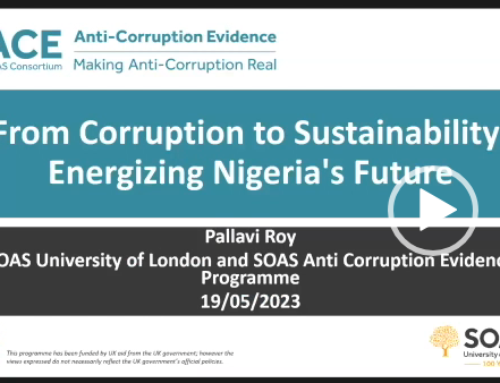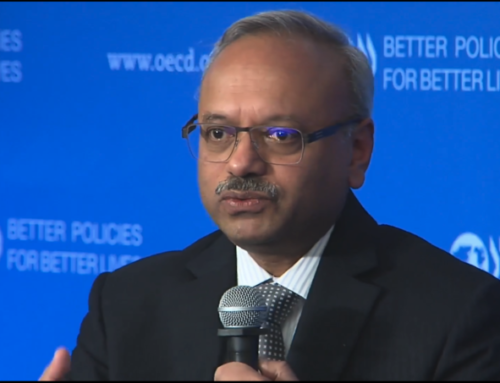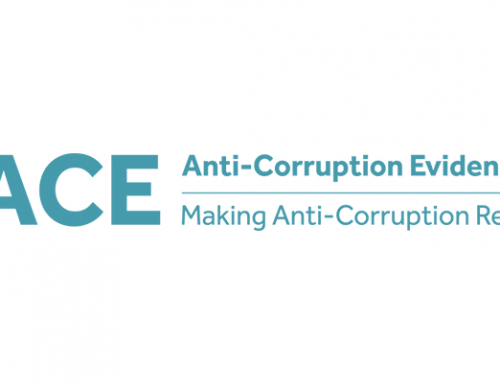Summary and recording of a SOAS-ACE Webinar on 22 September 2021
A few weeks ago, the SOAS ACE programme hosted a webinar discussion on how to make anti-corruption messaging more effective. Recent research led by Caryn Peiffer and Nic Cheeseman suggests that if targeted messaging is used to address specific corruption problems the chances of a positive outcome are higher. However, their research warns that generalised messaging can actually ‘prime’ citizens to over-emphasize the role of corruption in their lives and result in corruption fatigue. This conclusion about the inefficacy of generalised messaging and why this fails could also be extended in the context of Heather Marquette and Caryn Peiffer’s frameworks of ‘functional corruption’ as well Leena Koni Hoffmann and Raj Navanit Patel’s social norms framework in Nigeria about dealing with corruption that has become entrenched in some contexts.
Targeted messaging fits very nicely with the SOAS-ACE framework that states there must be targeted players within the relevant sector who want to implement relevant changes and policies and have the capacity to do that if appropriate policies and messages are in place. To put it another way, our framework states that anti-corruption is more likely where actors are interested in following specific rules and also have the power to monitor peers and take them to task if they are violating those rules. One of the most important reasons why corruption persists is an enforcement deficit. Even where robustly defined rules exist their enforcement can leave much to be desired, particularly if many or most of the actors in that activity do not want enforcement.
A lot of anti-corruption strategies fail because even if a policy appears to make sense it is often not implemented well, or at all. In most cases the reason is an inability to enforce. This is what leads to ‘despair’ or corruption fatigue. So, we need to ask who will support it, who will help enforce it and who will implement the enforcement? Solutions therefore require both the systems to enforce vertically but also the horizontal support for the policy from those directly involved in the activity.If there are no clear answers to ‘who will enforce’ messaging is unlikely to help.
To sum this up there are systemic linkages between a number of issues. There has to be 1) two- way flows of information, from actors to enforcers and broader society, and vice versa. Actors must want to share information about violations and respond to information in their own interest 2) this is clearly linked to the issue of feasibility, ie, the messaging has to be such that it reminds actors of the real benefits of the feasible anti-corruption strategy for the actors themselves and 3) All of this is happening in a context of a massive ‘corruption equilibrium’, what we describe as ‘adverse contexts’ so there has to be realism about how success is measured And finally 4) Some corruption may be functional and responding to other governance and policy failures, and social norms may have adapted to it, which relates back to identifying the more feasible instances first.
You can listen to the fascinating conversation between our panellists Caryn Peiffer (University of Bristol), Leena Koni Hoffmann (Chatham House), Heather Marquette (University of Birmingham and FCDO) and Nic Cheeseman (University of Birmingham) as they consider the interactions between these systematic linkages.
Watch on YouTube: https://youtu.be/ROgXrRBjRtM
Further reading
Cheeseman, Nic, and Caryn Peiffer. ‘The Unintended Consequences of Anti‐corruption Messaging in Nigeria: Why Pessimists Are Always Disappointed’. https://ace.soas.ac.uk/publication/unintended-consequences-of-anti-corruption-messaging-in-nigeria/.
‘Why Anti-Corruption Campaigns Are Bad for Democracy’. https://ace.soas.ac.uk/why-anti-corruption-campaigns-are-bad-for-democracy/.
‘Why Efforts to Fight Corruption Hurt Democracy: Lessons from a Survey Experiment in Nigeria’. https://ace.soas.ac.uk/publication/why-efforts-to-fight-corruption-hurt-democracy-nigeria/.
‘Hoffmann and Patel – Collective Action on Corruption in Nigeria.Pdf’. https://www.chathamhouse.org/sites/default/files/2021-03/2021-03-25-corruption-nigeria-religion-hoffmann-patel.pdf.
Hoffmann, Leena Koni, and Raj Navanit Patel. ‘Collective Action on Corruption in Nigeria’, n.d. https://www.chathamhouse.org/sites/default/files/2021-03/2021-03-25-corruption-nigeria-religion-hoffmann-patel.pdf.
Hoffmann, Leena Koni, and Raj Navanit Patel. ‘Pass-Mark Bribery in Nigerian Schools:Strong Incentives and Weak Consequences for Corruption’. https://www.chathamhouse.org/sites/default/files/2021-09/2021-08-27-pass-mark-bribery-nigeria-hoffmann-patel.pdf.
Khan, Mushtaq, Pallavi Roy, and Antonio Andreoni. ‘Anti-Corruption in Adverse Contexts: Strategies to Improve Implementation’. Working paper. SOAS https://ace.soas.ac.uk/wp-content/uploads/2019/12/ACE-BriefingPaper006-NG-191202.pdf.






